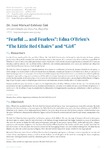“Fearful ... and Fearless”: Edna O’Brien’s “The Little Red Chairs” and “Girl”

Use este enlace para citar
http://hdl.handle.net/2183/25966Coleccións
- Investigación (FFIL) [877]
Metadatos
Mostrar o rexistro completo do ítemTítulo
“Fearful ... and Fearless”: Edna O’Brien’s “The Little Red Chairs” and “Girl”Autor(es)
Data
2020Cita bibliográfica
Estévez-Saá, J. M. (2020). “Fearful … and Fearless”: Edna O’Brien’s “The Little Red Chairs” and “Girl”. Oceánide, 13, 78-84.
Resumo
[Abstract] Red Chairs has been acclaimed as her masterpiece by Philip Roth in the book jacket cover, and as her most ambitious novel by Éilís Ní Dhuibhne at the moment of its publication (2015), which is a lot to say about an author who has been a referent in Irish literature since the 1960s. Girl has been also praised by influential figures such as Christina Patterson (2019) and Anne Enright (2019), among many other reviewers. The Little Red Chairs has been inspired by the historical episode of the Balkans War and the siege of Sarajevo. Divided in three parts, the novel takes its readers from the west of Ireland to the Balkans through London and The Hague Tribunal in a series of movements that serve the author to deploy the wide canvas of migratory exchanges in our current society which involve political exiles, refugees, expatriates and economic emigrants. Girl, has been described by O’Brien herself as “the hardest and the most painful” novel that she has ever written. On this occasion, the narrative is based on the kidnapping of more than two hundred schoolgirls by the Boko Haram Jihadist sect, after the author’s journey to Nigeria, where she interviewed many of the people involved in the tragic episode. My study of these two novels focuses on Edna O’Brien’s ethical compromise, giving voice to the most traumatic episodes and traumatized victims of our contemporary society, as well as on her brilliant use of the genre of the novel for recording the chaos, complexity, dislocation and fragmentation caused by radicalisms, political violence and terrorism. [Resumen] Las dos últimas novelas publicadas por Edna O’Brien, The Little Red Chairs (2015) y Girl (2019) han sido alabadas de forma unánime por la crítica. Philip Roth consideró The Little Red Chairs como la obra maestra de la escritora en la cubierta del libro, y para Éilís Ní Dhuibne se trató su novela más ambiciosa (2019), lo cual es mucho decir en el caso de una autora que ha sido un referente en la literatura irlandesa desde los años 60. Girl, su última novela, también ha sido reseñada positivamente, entre otros, por nombres tan influyentes como Christina Patterson (2019) y Anne Enright (2019). The Little Red Chairs se inspira en el episodio histórico de la Guerra de los Balcanes y el asedio de Sarajevo. Dividida en tres partes, la novela dirige a sus lectores desde el oeste de Irlanda hasta los Balcanes, pasando por Londres y el Tribunal de La Haya, en una serie de movimientos que sirven a la autora para ilustrar los intercambios migratorios en la sociedad actual, y que involucran a exiliados políticos, refugiados, expatriados y migrantes económicos. Girl ha sido descrita por la propia autora como la novela más dura y dolorosa que ha escrito. En esta ocasión, la historia se basa en el secuestro de más de doscientas escolares por el grupo yihadista Boko Haram en Nigeria, lugar al que la propia autora se desplazó para entrevistarse con numerosas personas involucradas en el trágico episodio. Nuestro estudio de estas dos novelas se centra en el compromiso ético de Edna O’Brien a la hora de dar voz a las víctimas de los acontecimientos más traumáticos de nuestra sociedad contemporánea, así como en el análisis del uso, a nivel formal, del género de la novela con el fin de reflejar el caos, la complejidad, la dislocación y la fragmentación causadas por radicalismos, violencia política y terrorismo.
Palabras chave
History
Ethics
Aesthetics
Migrations
Violence
The Little Red Chairs
Girl
Historia
Etica
Migraciones
Violencia
O'Brien, Edna
Ethics
Aesthetics
Migrations
Violence
The Little Red Chairs
Girl
Historia
Etica
Migraciones
Violencia
O'Brien, Edna
Versión do editor
Dereitos
Atribución 4.0
ISSN
1989-6328






